Event-based gameplay in multiplayer fantasy adventure games enhances player engagement through dynamic interactions and time-sensitive challenges. This article explores unique attributes like seasonal events and narrative-driven missions, the influence of cultural elements on gameplay design, and the challenges developers face in implementation. Additionally, it examines how player demographics affect participation and highlights rare attributes that enrich the gaming experience.
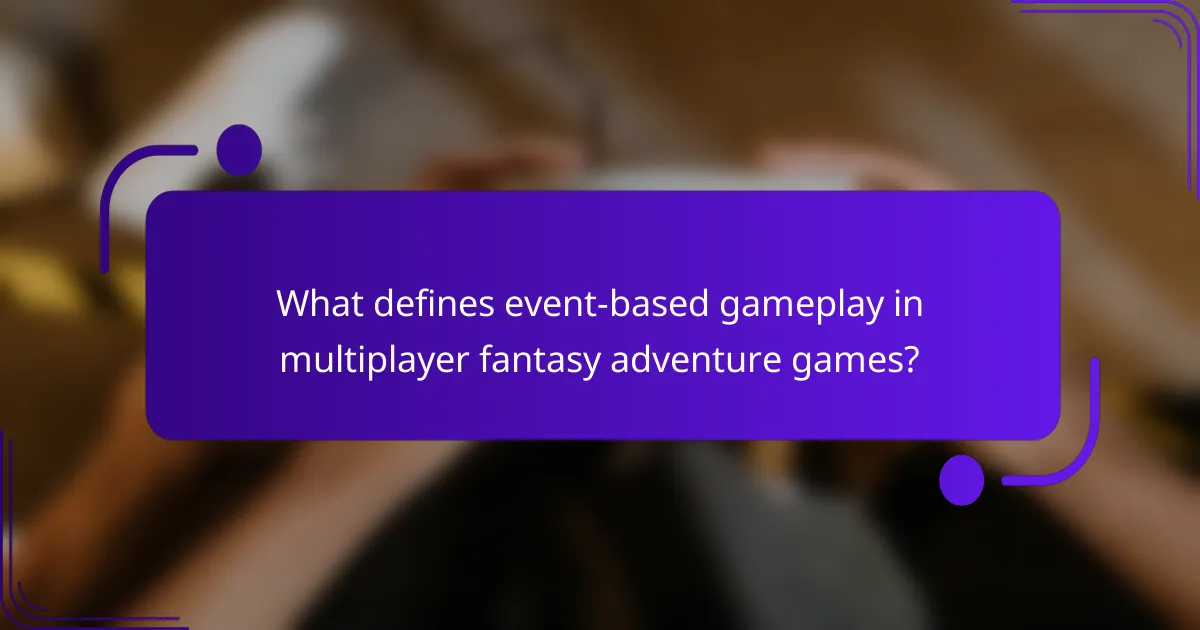
What defines event-based gameplay in multiplayer fantasy adventure games?
Event-based gameplay in multiplayer fantasy adventure games is defined by dynamic interactions and time-sensitive challenges. This approach enhances player engagement through limited-time events that introduce unique quests, rewards, and cooperative gameplay. Players collaborate to achieve common goals, fostering a sense of community. Unique attributes include seasonal events and narrative-driven missions that evolve the game world. These features create a vibrant, ever-changing experience that keeps players returning for new content.
How do events enhance player engagement and immersion?
Event-based gameplay significantly enhances player engagement and immersion by providing dynamic experiences. These events create a sense of urgency, encouraging players to participate actively. Limited-time quests and challenges often introduce unique rewards, fostering competition among players. Furthermore, events can feature exclusive storylines, deepening the narrative and emotional connection to the game world. By incorporating social elements, such as team-based activities, players build community ties, enhancing their overall experience. Overall, events serve as a catalyst for sustained interest and interaction within multiplayer fantasy adventure games.
Which mechanics are commonly used in event-based gameplay?
Event-based gameplay often utilizes mechanics such as limited-time quests, dynamic events, and seasonal challenges to engage players. These mechanics enhance interactivity and foster community participation. Limited-time quests encourage players to complete tasks within a specific timeframe, while dynamic events introduce spontaneous challenges that can alter the game world. Seasonal challenges often align with real-world events, offering unique rewards and experiences.
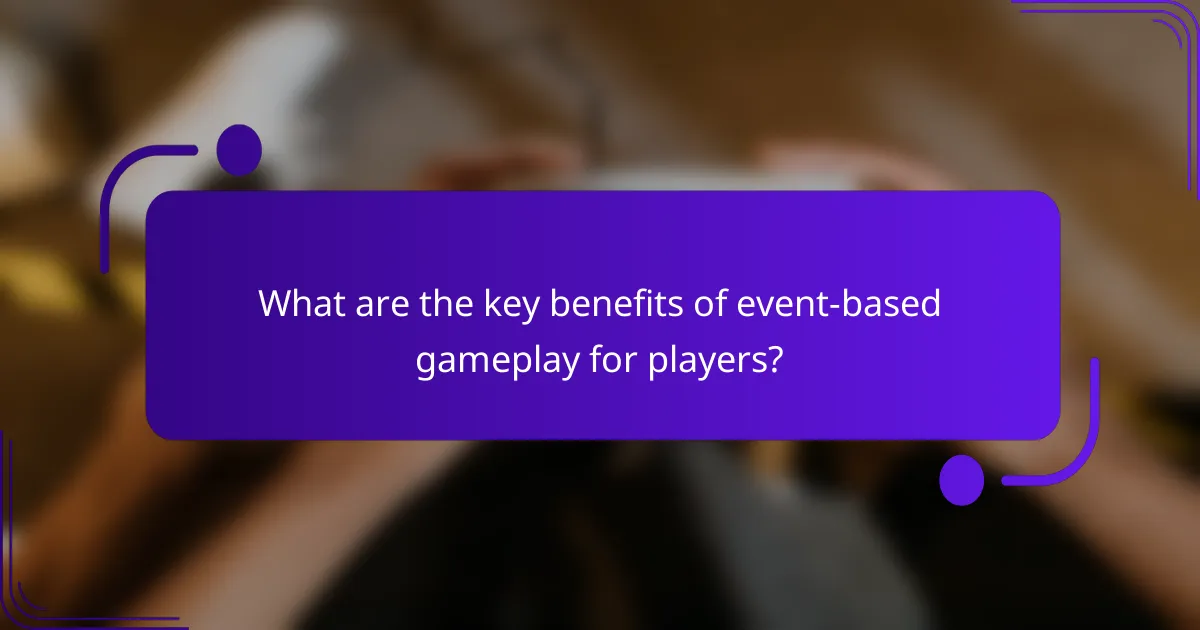
What are the key benefits of event-based gameplay for players?
Event-based gameplay in multiplayer fantasy adventure games offers players dynamic engagement, fostering community interaction and enhancing replayability. Players experience unique challenges and rewards that vary with each event, keeping gameplay fresh and exciting. For example, limited-time quests and seasonal events encourage collaboration and competition among players. This structure not only maintains interest but also builds a sense of urgency and exclusivity, motivating players to participate actively. As a result, event-based gameplay cultivates a vibrant gaming community, enhancing overall player satisfaction.
How does event-based gameplay foster community interaction?
Event-based gameplay fosters community interaction by creating shared experiences among players. These events encourage collaboration, competition, and communication, enhancing social bonds. Players often form teams or guilds, fostering long-term relationships. Unique in-game rewards from events further motivate participation, creating a vibrant community atmosphere. As a result, players feel a sense of belonging and investment in the game’s world.
What impact does it have on player retention rates?
Event-based gameplay significantly enhances player retention rates in multiplayer fantasy adventure games. By introducing limited-time events, developers create urgency and excitement, encouraging players to engage more frequently. These events often feature exclusive rewards, which serve as incentives for players to log in regularly. Additionally, the social aspect of collaborating with friends during events fosters a sense of community, further motivating players to remain active. As a result, games implementing event-based mechanics frequently report higher retention metrics compared to those without such features.
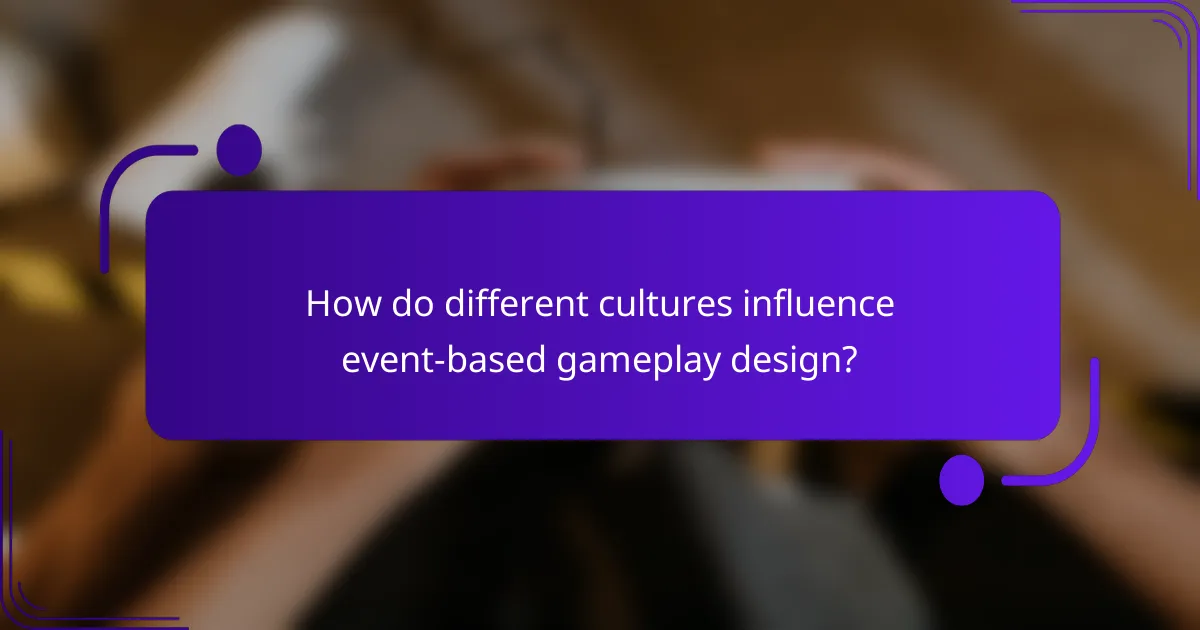
How do different cultures influence event-based gameplay design?
Different cultures significantly shape event-based gameplay design by introducing unique narratives, character archetypes, and gameplay mechanics. Cultural elements influence storytelling, player motivations, and social interactions within the game.
For example, Eastern cultures often emphasize collective achievements and harmony, leading to cooperative gameplay mechanics. In contrast, Western cultures may focus on individual accomplishments and competition, resulting in more competitive event structures.
Additionally, cultural festivals and traditions can inspire in-game events, enriching the player experience with authentic themes. These influences create diverse gameplay experiences that resonate with players from various backgrounds.
As a result, understanding cultural nuances is essential for developers aiming to create engaging and inclusive multiplayer fantasy adventure games.
What regional events resonate with players in North America?
Regional events that resonate with players in North America include seasonal festivals, comic conventions, and gaming expos. These events often feature exclusive content, competitions, and community engagement, enhancing the multiplayer fantasy adventure experience. For instance, events like PAX West and Gen Con provide unique opportunities for players to connect with developers and fellow gamers. Additionally, Halloween-themed in-game events align with cultural celebrations, offering special quests and rewards. These experiences deepen player engagement and foster a sense of community within the gaming landscape.
How do Japanese festivals shape gameplay experiences?
Japanese festivals enhance gameplay experiences by integrating cultural elements and community engagement into multiplayer fantasy adventure games. These events often introduce unique quests, limited-time items, and social interactions that reflect traditional practices. Players enjoy immersive storytelling and collaborative challenges, fostering a sense of belonging. Festivals can also feature exclusive rewards, promoting player retention and participation. Overall, these cultural celebrations enrich the gaming environment and create memorable experiences.
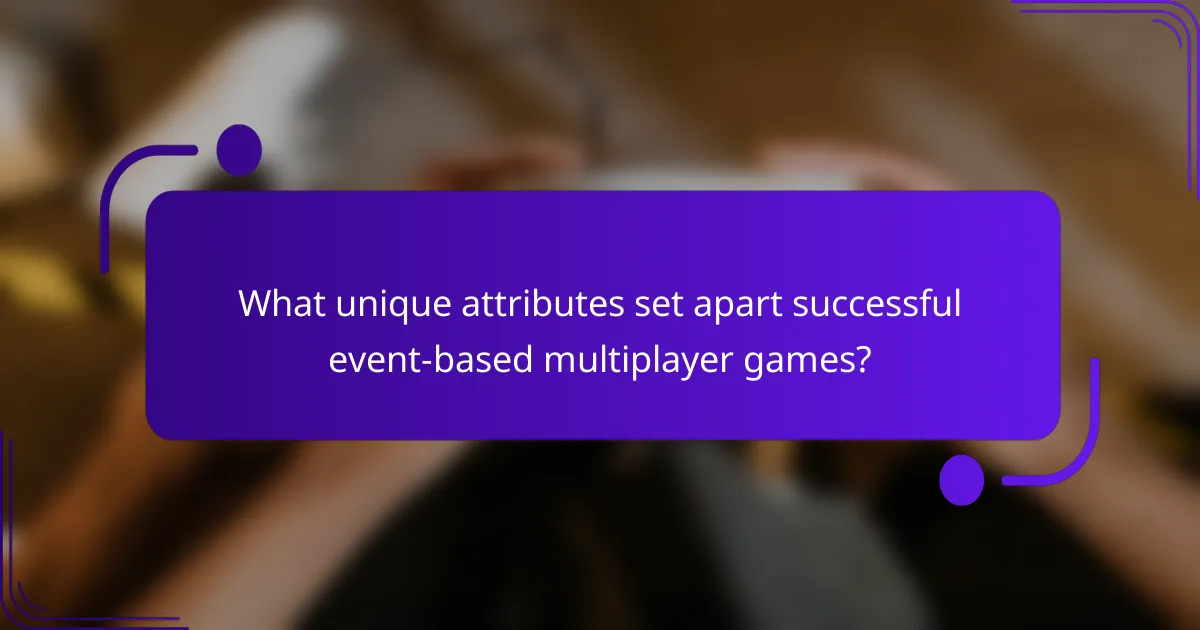
What unique attributes set apart successful event-based multiplayer games?
Successful event-based multiplayer games stand out due to their unique attributes that enhance player engagement. These games often feature limited-time events that introduce exclusive content, fostering a sense of urgency and excitement. They utilize dynamic environments that change based on player interactions, promoting collaboration and competition. Unique character abilities tied to events create diverse gameplay experiences, allowing players to explore different strategies. Furthermore, community-driven challenges encourage social interaction, strengthening player bonds and enhancing the overall gaming experience.
Which games exemplify innovative event-based gameplay?
Games that exemplify innovative event-based gameplay include “Destiny 2,” “Fortnite,” and “World of Warcraft.” These titles feature dynamic events that alter gameplay and player experiences. “Destiny 2” integrates seasonal events that introduce new storylines and challenges. “Fortnite” hosts live events that transform the game map and gameplay mechanics. “World of Warcraft” employs world events that engage players in unique quests and battles. Each game showcases how event-based mechanics enhance immersion and community interaction.
How do seasonal events create a dynamic gaming environment?
Seasonal events create a dynamic gaming environment by introducing limited-time challenges and rewards. These events engage players, enhance community interaction, and refresh gameplay. For example, a winter festival may offer exclusive quests and themed items, encouraging players to log in regularly. This approach fosters a sense of urgency and excitement, driving participation and retention. Additionally, evolving storylines during events can deepen player investment in the game world, making each seasonal update feel unique and impactful.
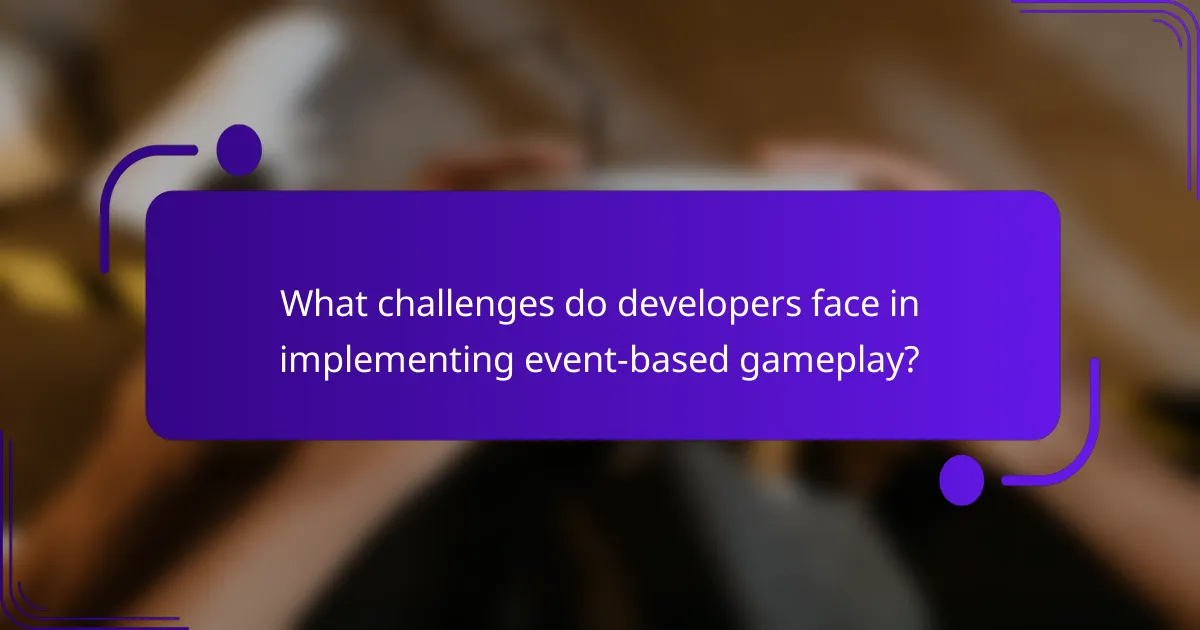
What challenges do developers face in implementing event-based gameplay?
Developers face various challenges in implementing event-based gameplay in multiplayer fantasy adventure games. Key issues include synchronization of events across players, ensuring fair gameplay, and managing server load.
Event synchronization is crucial as players must experience events simultaneously to maintain immersion. If events are out of sync, it can lead to frustration and confusion among players.
Balancing gameplay is another challenge, as events must not favor one player over another. Developers need to create systems that ensure all players have equal opportunities to engage with events.
Server load management is vital as well. High player counts and frequent events can strain server resources, leading to lag or crashes. Developers must optimize performance to provide a smooth experience.
How can technical limitations affect event execution?
Technical limitations can significantly hinder event execution in multiplayer fantasy adventure games. Issues like server capacity, latency, and bandwidth can disrupt gameplay, affecting player experience. For instance, high latency can lead to lag, making real-time interactions challenging. Additionally, limited server capacity may cause crashes during large-scale events, preventing players from participating. These factors can diminish engagement and satisfaction, ultimately impacting the game’s success.
What are common player feedback issues during events?
Common player feedback issues during events include server instability, matchmaking problems, and lack of clear communication from developers. Players often report frustration with lag and disconnections, impacting gameplay experience. Additionally, many express concerns over unbalanced character abilities, leading to unfair advantages. Feedback frequently highlights the need for better event rewards and clearer objectives, enhancing player engagement and satisfaction.
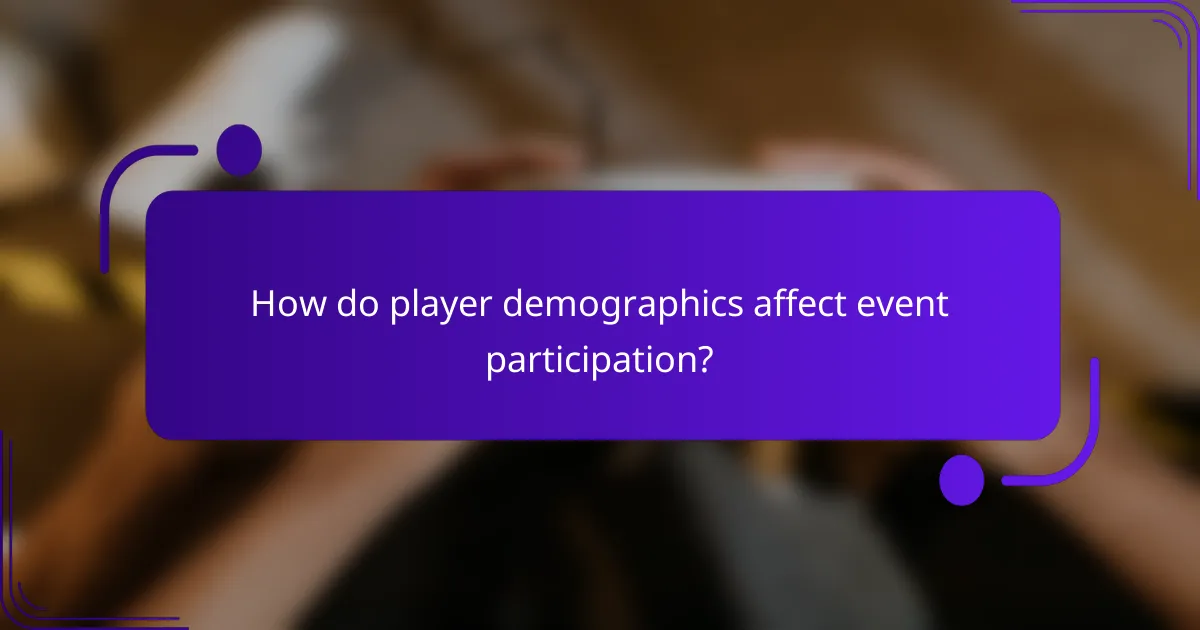
How do player demographics affect event participation?
Player demographics significantly influence event participation in multiplayer fantasy adventure games. Factors such as age, gaming experience, and cultural background shape players’ interests and engagement levels.
Younger players often seek fast-paced, competitive events, while older players may prefer cooperative or narrative-driven experiences. Additionally, players with extensive gaming experience are more likely to participate in complex events, while newcomers may shy away from them.
Cultural background can also affect participation; players from different regions may have varying preferences for event types, aesthetics, and gameplay mechanics. Understanding these demographics helps developers tailor events to maximize engagement and satisfaction.
Ultimately, analyzing player demographics allows for more targeted event designs, enhancing overall participation and enjoyment in multiplayer fantasy adventure games.
What motivates different age groups to engage in events?
Different age groups are motivated to engage in events by varying factors, such as social interaction, competition, and immersive experiences. Younger players often seek social connections and teamwork, while older players may prioritize nostalgia and strategic challenges.
For example, teenagers are drawn to the excitement of multiplayer gameplay and peer engagement. Young adults often appreciate the competitive aspects and skill development. Middle-aged players may enjoy the storytelling and exploration elements, seeking a deeper narrative experience. Seniors might engage for relaxation and community, valuing cooperative gameplay and social bonds.
Understanding these motivations can enhance event planning and gameplay design in multiplayer fantasy adventure games, ensuring they cater to diverse audience preferences.
How do player skill levels influence event design?
Player skill levels significantly influence event design in multiplayer fantasy adventure games by determining difficulty, engagement, and player satisfaction. Higher skill levels often lead to more complex challenges and strategic elements, enhancing the gameplay experience. Event designers must balance these factors to accommodate varying abilities, ensuring inclusivity while maintaining excitement. For instance, events tailored for advanced players may introduce unique mechanics or rare rewards, while beginner-friendly events focus on foundational skills and gradual learning curves. Ultimately, understanding player skill levels enables designers to create dynamic and immersive events that resonate with their audience.
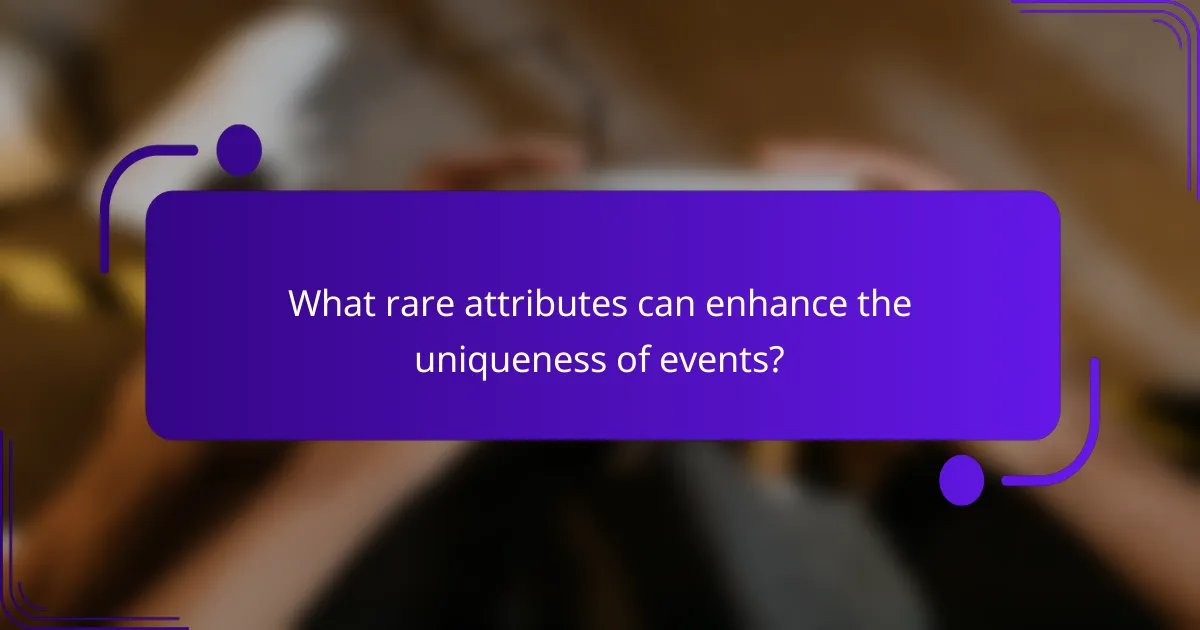
What rare attributes can enhance the uniqueness of events?
Rare attributes that can enhance the uniqueness of events in event-based gameplay include dynamic weather systems, customizable NPC interactions, unique lore-driven quests, and player-driven economy influences. These elements create immersive experiences and foster deeper engagement among players. Dynamic weather can alter gameplay conditions, while customizable NPC interactions allow for personalized storytelling. Unique lore-driven quests provide exclusive narratives, and player-driven economy influences add depth to resource management. These rare attributes contribute to a rich and varied gaming environment.
How do cross-platform events create broader player bases?
Cross-platform events broaden player bases by enabling diverse gaming communities to interact. These events attract players from various platforms, enhancing engagement and fostering a sense of unity. For instance, a cross-platform tournament can include players from consoles and PCs, increasing competition and participation. Additionally, these events often feature exclusive rewards, motivating players to join regardless of their gaming system. By promoting inclusivity, developers can cultivate larger, more vibrant player communities.
What role does narrative play in crafting memorable events?
Narrative plays a crucial role in crafting memorable events in multiplayer fantasy adventure games by enhancing player engagement. A compelling story immerses players, creating emotional connections and memorable experiences.
Effective narratives provide context for gameplay, guiding players through quests and challenges. They establish a rich world where players can explore unique attributes, such as character backstories and lore. This depth encourages players to invest time and effort into the game, enhancing their overall enjoyment.
Additionally, narratives can introduce rare events or encounters, making gameplay unpredictable and exciting. These moments can become highlights, fostering community discussions and shared experiences among players.
Ultimately, a well-crafted narrative not only enhances gameplay but also ensures that events remain memorable, encouraging players to return and share their experiences.
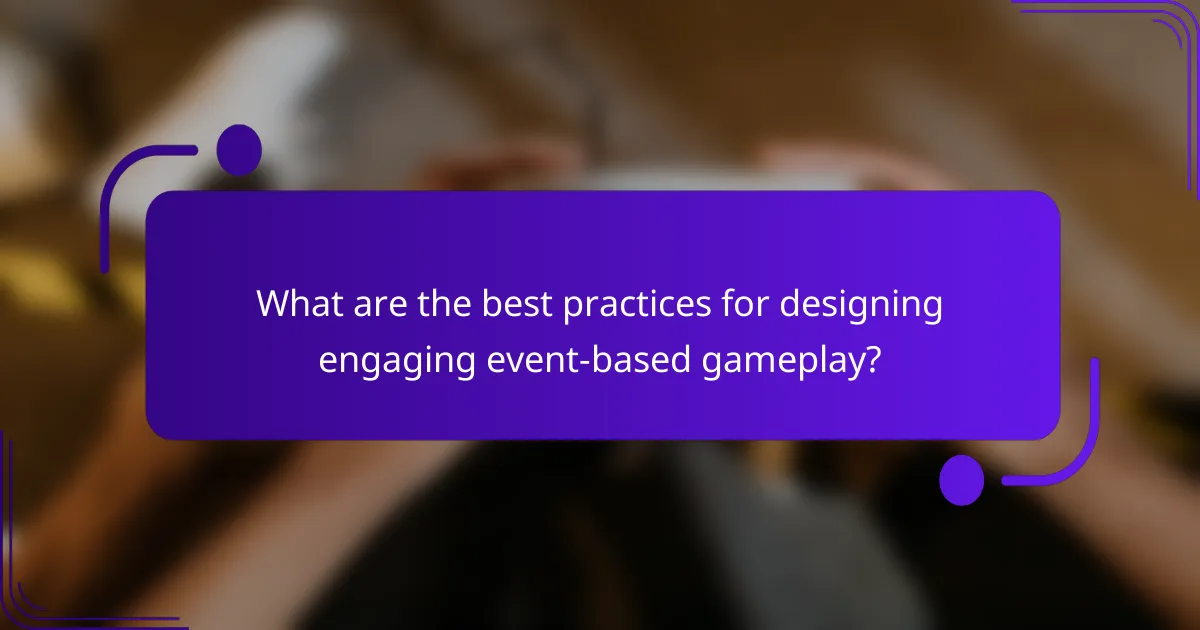
What are the best practices for designing engaging event-based gameplay?
To design engaging event-based gameplay in multiplayer fantasy adventure games, focus on immersive experiences, dynamic challenges, and community interaction. Incorporate time-limited quests that encourage player collaboration and competition. Use narrative-driven events that deepen the lore and provide unique rewards, enhancing player investment. Implement varied gameplay mechanics that cater to different playstyles, ensuring all players feel included and engaged.
How can developers balance rewards and challenges in events?
Developers can balance rewards and challenges in events by ensuring that the difficulty matches player skill levels. This alignment keeps players engaged while providing a sense of achievement. Reward systems should offer meaningful incentives that motivate players to overcome challenges. Regularly adjusting event parameters based on player feedback can enhance the experience and maintain interest. Moreover, incorporating diverse challenges can cater to different play styles, enriching the overall gameplay experience.
What strategies can enhance player satisfaction during events?
To enhance player satisfaction during events in multiplayer fantasy adventure games, developers should focus on immersive experiences, community engagement, and rewarding gameplay.
Creating unique in-game events that offer exclusive rewards fosters excitement. Incorporating player feedback into event design ensures that experiences align with player preferences. Additionally, offering cooperative challenges encourages teamwork, enhancing social interaction among players.
Implementing dynamic difficulty adjustments can cater to varying skill levels, making events accessible yet challenging. Regular updates and themed events keep the content fresh, maintaining player interest over time.
Finally, recognizing player achievements through leaderboards or special titles can enhance a sense of accomplishment, further boosting satisfaction.